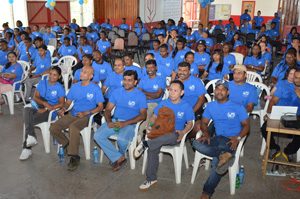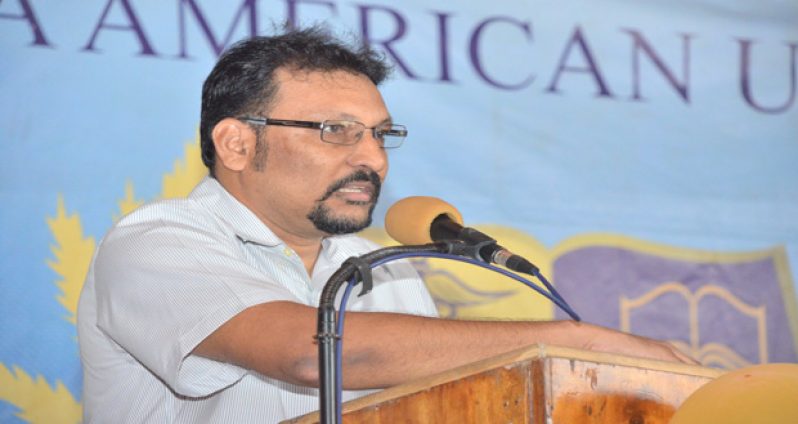“THE United States of America remains committed to Guyana’s aim to build a health system that is responsive to the needs of Guyanese citizens, especially those most vulnerable to Stigma and Discrimination.” So says, PEPFAR Coordinator Ms. Stephanie Joseph De Goes, of the United States Embassy in Georgetown.
The PEPFAR Coordinator made these remarks two Saturdays ago, as she delivered the feature address at a Rally in celebration of Texila American University’s 5th anniversary at the Woolford Avenue- based institution in Guyana, where some 200 medical students and faculty staff were gathered.
Having been asked to speak on one of the U.S. Government’s contributions to Guyana’s health- care system, Ms. Joseph De first congratulated Texila American University and its students on their achievement, starting with seven graduates in the first instance, and now looking forward to graduating 400 this year.

“Your contributions are really what matters . Health- care workers are one of the biggest contributions to any society in the country, so you are making a tremendous contribution. Without health- care workers the health and productive needs of people would not be met,” Ms. De Does said.
She went on to quote President Obama as saying that the only way to achieve important health goals is through health- care workers. “There are simply no short cuts,” she affirmed.
U.S. Contribution to Guyana HIV/AIDS programme
And commenting on one of the United States contributions to Guyana – the topic on which she was asked to speak– the PEPFAR Coordinator cited the President’s Emergency Plan for AIDS Relief. “The U.S. supports this agenda. We help support the Government of Guyana in developing its Stigma and Discrimination Policy.
“We also help reduce Stigma and Discrimination by training health- care workers. Other significant contributions include helping the National AIDS Programme achieve a reduced HIV prevalence; [and ultimately] a reduction in AIDS-related deaths.
“We support Guyana’s efforts to supply life-saving HIV treatment, and we have supported the provision of more than 350,000 HIV tests and Counselling Services.
“Overall, the U.S. remains committed to Guyana’s aim to build a health system that is responsive to the needs of Guyanese citizens, especially those most vulnerable to Stigma and Discrimination,” Ms. De Goes said.
The U.S. official said that PEPFAR’s primary focus is HIV, adding “I believe our contributions have supported growth of the [Guyana’s] health system,” She opined that Texila American University and its students are positioned to continue that legacy.
“Being medical students places you in position to advocate for and promote innovations in health care, accountability, political will and human rights. As the future health- care workers in Guyana and wherever you may serve, you have the responsibility to support the right of any person to access the highest achievable standard of health,” the PEPFAR Coordinator affirmed.”
And concurring that health- care workers are agents of sustainable development, and that healthy populations make for a productive work force, Ms. Ge Goes declared: “Your educators who shape you really are agents of sustainable development. You play an essential role also in the broader social- economic development context.”

She said that PEPFAR’s primary focus is HIV, adding, “I believe our contributions have supported growth of the health system.”
And alluding to the many patients along the way reaching out to be treated with human dignity, De Goes commented, “You can institutionalise a curriculum that addresses and teaches you, the students, the importance of having human rights; the importance of creating an environment where everyone feels entitled to access care and create a generation of providers that would change the way we do business… eventually bringing an end to HIV/ AIDS and other diseases, Ms De Goes concluded.
Chief Medical Officer
Meanwhile, Guyana’s Acting Chief Medical Officer Dr. Jeetendra Mohanlall, on behalf of the Minister of Public Health Dr. George Norton and Dr Karen Cummings who were both unavoidably absent, brought regards and warm congratulations to the institution on its signature accomplishment.
Dr. Mohanlall acknowledged that as Guyana continues to wage an unrelenting battle against HIV/AIDS, much has been accomplished with the support of key international partners, namely, the Government and people of the United States of America offering financial and technical assistance through the President’s Emergency Plan for AIDS Relief (PEPFAR) and executed by agencies within the United Nations system. For this, he expressed appreciation.
International partners’ support, coupled with strong and effective leadership at the local level, the steady commitment of Guyana’s health sector, the private sector and Non-Governmental Organisations (NGOs) have been able to initiate a marked reduction in the prevalence of HIV/AIDS locally, he said.
Whereas Guyana was at one time trailing Sub-Saharan Africa, the countries hardest hit with HIV/AIDS, we now have a prevalence rate of 1.1 per cent, as outlined in the Health Vision 2020 Strategy.
Dr. Mohanlall observed that Guyana like any other developing nation assiduously strides to provide a population with optimal, equitable and accessible health- care services. As a result, the Ministry of Public Health has evolved into one of the largest and most diversified ministries in the country.
“We have major hospitals situated in each region and specialise in many services including public/private arrangement and initiatives and a host of clinicians who have benefited from both local and international training for improved competence and cooperative care. He said organisations such as the Caribbean Heart Institute have also given Guyana recognition as being progressive where specialised services are concerned.
And there are plans for the improvement and expansion of health services, all guided by the proactive and holistic strategy – the Health Vision 2020, he added.
“Health Vision 2020 outlines how Guyana plans to achieve the goal of health for all in Guyana, by highlighting our services, priorities, and our health systems improvement and the implementation plans.
“Health for All, recognises that, in addition to Guyanese, there are many other people in Guyana such as: other CARICOM nationals, foreign students, investors, businessmen and friends, who live here and share in the desire for optimum health as we envision for the people of Guyana.”
The preparation of Health Vision 2020 is a cooperative endeavour involving government agencies, programmes and stakeholders under the leadership of the Ministry of Health. The work was facilitated with assistance from a Pan American/World Health Organisation (PAHO/WHO) consultant. The chief medical officer acknowledged the support and technical cooperation given by the PAHO/WHO whose assistance made possible, the successful completion of this critical document.
HIV/AIDS aside, he hinted at some of the overall challenges faced by the Ministry of Public Health (MoPH), Dr. Mohanlall pointed to: maternal and infant and mortality rates, suicide, obesity, mental illnesses, and the burning issue of “retaining health- care professionals.”
The CMO said the ministry feels strongly that the challenges faced are not insurmountable and that addressing these could be greatly enhanced by fostering new and strengthening existing collaborations with key partner institutions.
“ I am pleased to say that one such partnership exists with Texila American University, where the ministry has benefited from partnerships with universities allowing for external training of medical personnel from Guyana,” he said.
Disease burden
According to Health Vision 2020, health outcomes in Guyana have improved steadily over the past decade, reflecting the strength of commitment of the government, and Guyana’s development partners to meeting national and international targets for health, through increased investments in health and social spending and the appropriateness of the health interventions taken.
The success of partnerships, notably PAHO/WHO in response to communicable diseases has resulted in the control of malaria, tuberculosis (TB) and HIV/AIDS. As a consequence, Guyanese life expectancy has now moved from 63 in 1998 to 67 in 2010.
In 2011, the Millennium Development Goals (MDG) Progress Report stated that a number of 2015 targets have been reached and that the country is on track to reach targets for HIV/AIDS, education, water and sanitation.
Health Vision 2020 cites the spread of HIV/AIDS as slowing, with prevalence declining from 7.9 per cent in 1995 to 1.1 per cent in 2011, and the disease status now being more characteristic of chronic disease, rather than an epidemic as in 2004, before the scaling up of interventions.
The CMO acknowledges that Guyana has a lot of support from PEPFAR, with the UN Agencies rolling out support for different programmes and key populations such as: PAHO/WHO, which places special emphasis on TB, Malaria and Tobacco; the CDC– Prevention of Mother-to-Child and Health Information System; Transmission and Voluntary Counselling and Testing (VCT) ; USAID – until recently, on Youth Friendly Health Centres; International Labour Organization (the ILO)- the removal of Stigma and Discrimination Against HIV, among others.
Within the UN System generally, and in the UNDP in particular, the inter-relationship between HIV/AIDS and the attainment of development goals are fully recognised. UNDP’s corporate strategy on HIV/AIDS therefore, works for sustainable results based on five service areas: Advocacy and Policy Dialogue; Capacity- Building; Mainstreaming HIV/AIDS, Human Rights and Information Multi-Media Technology. Working as a synergistic package, these service areas support, strengthen, deepen and intensify the response to HIV/AIDS, a UN official said. (Shirley Thomas)













